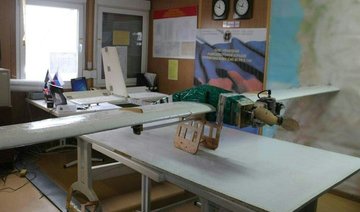DAMASCUS: Russian air defense assets in Syria have downed 45 drones targeting their main base in the country, its military said, after an attack by Daesh on a Syrian army base a day earlier killed seven troops.
The Russian Defense Ministry spokesman, Maj. Gen. Igor Konashenkov, said that five of them were shot down in the last three days near the Hemeimeem air base. The base in the province of Latakia serves as the main hub for Russian operations in Syria.
Konashenkov said that while the drones appear primitive, they use sophisticated technologies and have a range of up to 100 km.
He charged that the militants would not have been able to assemble the drones without outside help, but didn’t specify who might have assisted them.
The Russian general noted that the number of drone attacks have increased recently, adding that all of them were launched by militants based in the northern province of Idlib.
Idlib has become the main base for President Bashar Assad’s foes, who moved there after being forced out from other areas across Syria as part of surrender deals often negotiated with the Russians on behalf of the Syrian regime. With Russia’s support, Assad’s forces have regained control over key cities, like Aleppo, Homs and Daraa, the southern city where the uprising against the government began in March 2011.
The authorities also have restored control over key highways, allowing safe travel all the way form the Jordanian border in the south to the central province of Hama.
In Homs, regional Gov. Talal Barazi told international reporters during a trip organized by the Russian Defense Ministry that a key bridge on a highway linking the Homs and Hama provinces that was destroyed in 2012 has been restored.
Barazi said that later this year his administration plans to start restoring the old part of Homs that was ravaged by fierce fighting in 2014.
He said that about 650 fighters who had left the province and moved to Idlib had come back to Homs and agreed to lay down their arms.
Barazi said that the historic city of Palmyra, home to one of the Middle East’s most spectacular archaeological sites, could be open for tourist visits by next summer.
Many of the city’s archaeological treasures were badly damaged by Daesh in 2015. Palmyra is a world heritage site protected by the UN’s cultural agency.
In Aleppo, Hazem Ajan, the director of the city’s industrial cluster, said that about 500 companies have resumed operations in the area since the government reclaimed control in 2016.
Meanwhile, in eastern Syria, at least seven soldiers were killed with Daesh attacked an army position near the city of Deir Ezzor, a monitoring group said.
The Syrian Observatory for Human Rights said the attack on Wednesday near the Taim oil field was the militants’ closest approach to the Deir Ezzor air base since the government recaptured it from the group last year.
Mohammed Hassan, a media coordinator for the activist-run Deir Ezzor 24, said at least 12 soldiers and five IS militants were killed in the clashes.
A recent UN report warned that Daesh, which once boasted of commanding a caliphate stretching across northern Syria and Iraq, is adopting a guerrilla profile.
The group may still have up to 30,000 members distributed between Syria and Iraq, according to the UN report.
Also on Thursday, Assad and his wife Asma visited one of the tunnels once used by fighters outside Damascus to move vehicles, weapons, and fighters while they were under siege, the president’s office said. Regime forces have uncovered a network of tunnels underneath the Eastern Ghouta suburbs of the capital since they seized the area from opposition forces in a fierce campaign earlier this year.
The tunnel visited by the Assads was decorated with reliefs sculpted by a team of artists supervised by the government showing soldiers fighting and triumphing over their opponents.


























